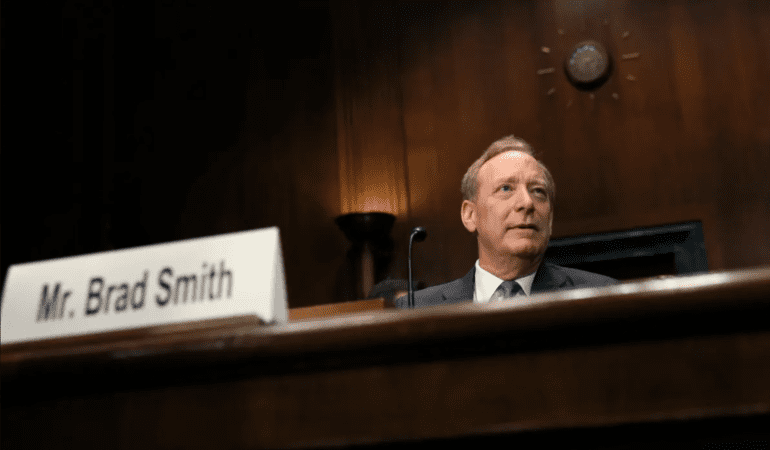TL;DR:
- Microsoft and Nvidia appeared before the Senate for AI regulation discussions.
- Senators advocate for risk-based AI regulation, introducing a bipartisan framework.
- Both companies have invested heavily in AI development and partnerships.
- Digital advocacy groups urge caution, emphasizing the need for effective regulation.
- The discussion includes content use, disinformation, data privacy, and child protection.
- Nvidia dismisses fears of sentient AI, emphasizing human control.
Main AI News:
In the realm of artificial intelligence, two industry giants, Microsoft and Nvidia, recently found themselves under the Senate’s scrutiny. As the federal government grapples with the need to regulate this transformative technology, Microsoft’s President, Brad Smith, and Nvidia’s Chief Scientist, William Dally, joined the stage on Tuesday for a crucial discussion. Accompanying them was Woodrow Hartzog, a distinguished professor of law at Boston University School of Law.
At the outset of the hearing, Senator Richard Blumenthal emphasized the importance of a risk-based approach to AI regulation. Just this week, he and Josh Hawley, a Missouri Republican, introduced a bipartisan AI framework. This framework proposes that companies dealing with high-risk AI technology must register with an independent oversight body responsible for licensing. Additionally, it calls for a reevaluation of a section in the Communications Decency Act of 1996, which currently does not provide liability protection to tech companies developing AI tools.
Blumenthal asserted, “Make no mistake, there will be regulation. The only question is how soon and what kind. It should be regulation that fosters American free enterprise excellence while simultaneously ensuring protective measures, tailored to the associated risks. In essence, risk-based rules.”
Both Microsoft and Nvidia have been prominent players in the AI arena, substantially investing in the development and utilization of AI resources. Microsoft, for example, engaged in numerous partnerships and developed its proprietary AI technology, Copilot. They also invested $10 billion in OpenAI, the parent company of ChatGPT. On the other hand, Nvidia has thrived by focusing on building computer chips for AI systems, amassing over $13 billion in revenue in the second quarter alone. With a current valuation of $1 trillion, the 30-year-old company stands as one of the foremost beneficiaries of the AI boom, with its chips powering many major AI tools, including ChatGPT.
However, as efforts to regulate these technologies persist, digital advocacy groups caution against trusting tech companies to self-regulate. They urge Congress to remain vigilant in their decision-making processes.
“Big tech has demonstrated what ‘self-regulation’ entails, primarily serving their own interests,” stated Bianca Recto, communications director for Accountable Tech. “Senators must approach this week’s AI hearings with discernment, ensuring our safety is not sacrificed for the sake of savvy PR.”
In their opening testimonies, both Microsoft and Nvidia commended the Senate for crafting a legal framework requiring the certification of “high-risk” AI by an oversight board. They also emphasized the distinction between advanced AI and less capable systems. However, Hartzog urged Congress to avoid half-measures and industry-led approaches that focus solely on ethics and transparency. He emphasized the need for mechanisms to enforce liability and other vital regulations.
While industry representatives concurred that Congress was moving in the right direction, Nvidia’s Dally addressed unfounded fears of AI systems becoming sentient. He clarified that AI is fundamentally a software program limited by its training, inputs, and the nature of its output. Thus, humans will always retain decision-making power over AI models.
The hearing also delved into concerns regarding the current use and training of AI. Senator Amy Klobuchar questioned Smith on how AI systems use content, particularly journalism. Smith advocated for local journalists and publications to have control over whether their content is used for training, emphasizing collective negotiation.
Several senators raised concerns about disinformation, especially in the context of elections. Blumenthal stressed the need for effective enforcement as deepfakes become more sophisticated and harder to distinguish from authentic content. Hartzog suggested that Congress consider rules and safeguards to limit the financial incentives behind technologies that enable the proliferation of false information.
Hawley brought up the topics of data privacy and protections for children using AI systems. He asked Smith if Microsoft would consider raising the age limit for using AI systems. Smith emphasized adhering to existing laws regarding child user data and argued that the suitability of AI usage for individuals under 13 depends on the specific context and safeguards in place.
This hearing marks a significant week for AI discussions on Capitol Hill. On the horizon, the Senate will host its inaugural AI Forum, convened by Senator Chuck Schumer, featuring prominent tech executives such as Google’s Sundar Pichai, Mark Zuckerberg, Elon Musk, and Nvidia’s Jensen Huang. Stay tuned for more developments in the ever-evolving world of AI regulation.
Conclusion:
The Senate AI hearings with Microsoft and Nvidia highlight the increasing focus on regulating AI technologies. The proposed risk-based regulatory framework signals a potential shift in the industry, demanding companies to prioritize safety and oversight. As these discussions progress, the market can anticipate a more structured and accountable AI landscape, ensuring responsible AI development and usage, but with the challenge of balancing innovation with regulation.

